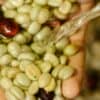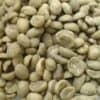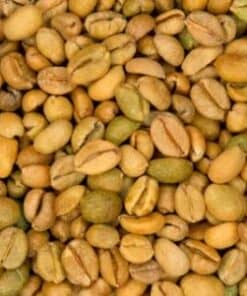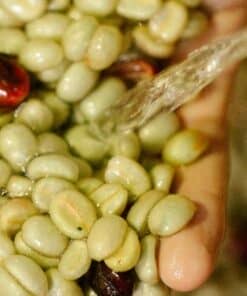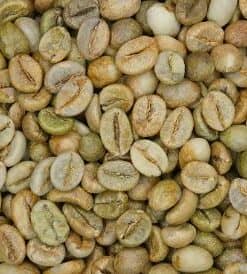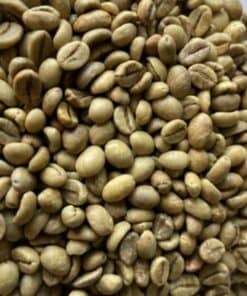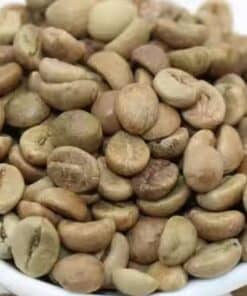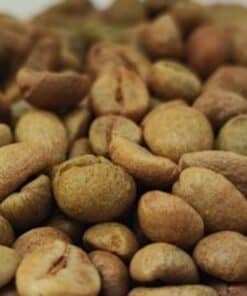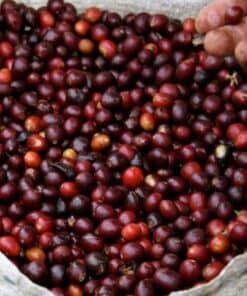Vietnam Robusta Honey Processed Coffee (SCR18, SCR16)
Variety: Robusta
Region: Daklak – Vietnam Origin
Elevation: 800m
Processing: Honey Process
Ripe Rate: 99-100%
Moisture: 12,5%
Foreign Matter: 0.1%
Black: 0.1%
Broken: 0.5%
Rate on Sieve: Min 90%
Bean size (Sieve): S16, S18
Capacity: 3000 tons/year
Price per kilogram: $/kg
Vietnam Robusta Honey Processed Green Coffee Beans
Vietnam’s Robusta Honey Processed Green Coffee Beans are a standout product in the coffee world. This method retains more mucilage during processing, resulting in a deep red color as the beans dry. The process enhances the beans’ sweetness, refines their flavor, and delivers a unique taste profile.
The Honey Processing Method
Originating in Costa Rica, the honey method was developed to improve coffee quality and has become popular in Central American countries. Despite its name, no honey is used during this process. Instead, the term “honey” refers to the sticky mucilage that surrounds the coffee beans.
1. Vietnam Honey Robusta Coffee – A Sweet and Unique Flavor
1.1. What Is the Robusta Honey Coffee Process?
The honey process involves removing the outer skin and part of the inner fruit from the harvested coffee cherries. The beans are then dried on racks or yards, with the mucilage left intact. This remaining pulp accelerates fermentation, imparting sweetness and balance to the coffee.
When executed carefully, the honey method creates a distinctive flavor profile that blends the strengths of both dry and wet processing methods. The drying phase is crucial, as it influences the beans’ final flavor and quality. This stage requires careful monitoring to prevent mold or defects and to protect the beans from insects.
Coffee farmers use a grading system to determine the amount of mucilage left during processing, typically categorized as 40%, 60%, 80%, or 100%.
1.2. Yellow Honey, White Honey, Red Honey, and Black Honey Coffee
Honey-processed Robusta coffee is divided into categories based on the percentage of mucilage retained during processing:
- Yellow Honey: Beans with a moderate mucilage content.
- Red Honey: Beans with a higher mucilage content, resulting in a deeper flavor.
- Black Honey: Beans with the most mucilage, creating a rich and intense profile.
Each type of honey coffee offers unique flavors and aromas, with variations determined by the processing and drying stages.
1.3. Quality of Honey Processed Coffee
Honey processing leaves some or all of the mucilage on the beans, enriching them with natural sugars. This creates a coffee with a fruity aroma, a sweet aftertaste, and a balanced bitterness. Robusta Honey coffee stands out with its honey-like sweetness and robust flavor, making it ideal for blending or brewing on its own.
1.4. The Origin of Honey Robusta Coffee in Vietnam
Robusta coffee was first discovered in Congo-Belgium in the early 1800s and later introduced to Southeast Asia to combat rust. In Vietnam, it has become a staple crop, with Robusta Honey processing gaining popularity in recent years.
Producers in Dak Lak Province have collaborated with international roasters to meet the demand for high-quality coffee. Baolong Farmfresh, among others, has adopted this method, elevating Vietnam’s coffee industry to new heights.
1.5. Flavor Profile of Honey Robusta Beans
Robusta Honey coffee is known for its robust caffeine content (3-4%) and unique balance of flavors. It combines a light fruity aroma, moderate sourness, and a rich bitterness, with a sweetness reminiscent of natural honey. This makes it a favorite for both coffee connoisseurs and casual drinkers.
2. Comparing Coffee Processing Methods
The choice of processing method—wet, dry, or honey—plays a significant role in the final taste and quality of coffee. Each method offers distinct advantages and flavor profiles, with honey processing standing out for its balanced sweetness and complexity.
3. Where to Buy Vietnam Robusta Honey Processed Coffee Beans?
With extensive experience in production, processing, and quality management, Baolong Farmfresh is a trusted supplier of high-quality Robusta Honey green coffee beans.
Baolong Farmfresh ensures optimal quality control through its closed production model, from collection and processing to supply and distribution. This allows the company to offer premium coffee at competitive prices.
If you’re interested in Vietnam’s Robusta Honey coffee, contact Baolong Farmfresh for more information!


